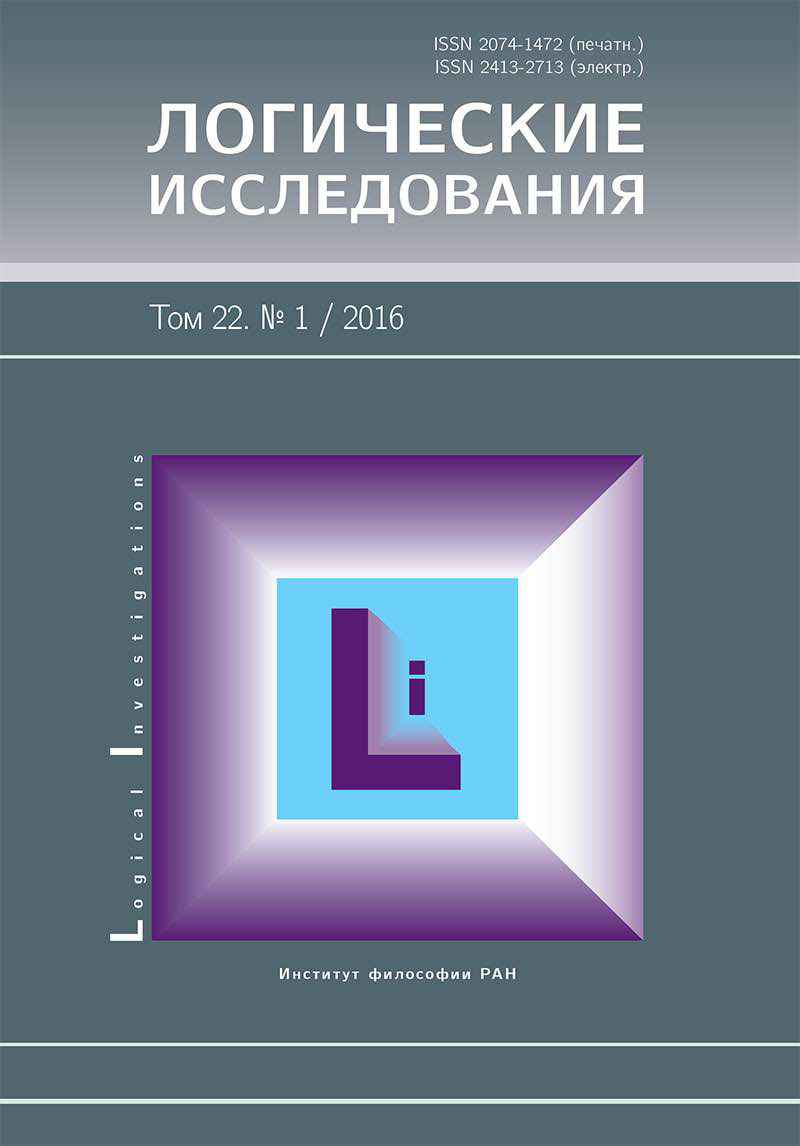The Interpretation of Categorical Propositions in Terms of Relevant Entailment
##plugins.themes.bootstrap3.article.main##
Abstract
In the paper we state a non-standard semantics for positive syllogistic language, where the validity of atomic formulas (the forms of categorical propositions) is defined in terms of relevant entailment. This idea is realized within the bounds of V.I. Shalack’s approach to the construction of syllogistic semantics [3]: the formulas of propositional logic are assigned to the subjects and the predicates as their meanings, and the validity definitions for syllogistic formulas base on the relation of classical deducibility. In the paper we change this relation for the entailment relation of relevant system $FDE$. Interpretative function $\delta$ assigns a formula of the propositional language with primitive connectives$\neg$, $\wedge$ и $\vee$, for every universal term. We postulate the following validity conditions for syllogistic formulas under the interpretation $\delta$: $SaP$ is valid iff $\delta(S)$ entails$\delta(P)$ in FDE; $SeP$ is valid iff $\delta(S)$ entails $\neg\delta(P)$; $SiP$ is valid iff $\delta(S)$ doesn’t entail $\neg\delta(P)$; (SoP$ is valid iff $\delta(S)$ doesn’t entail $\delta(P)$; for complex formulas they are usual. Syllogistic calculus formalized the set of logical valid formulas, contains the following postulates: classical tautologies, axiom schemes $(MaP \wedge SaM) \supset SaP$, ($MeP \wedge SaM) \supset SeP$, $SeP \supset PeS$, $SaS$, $SiP \equiv \neg SeP$, $SoP \equiv \neg SaP$, and the only rule modus ponens. The soundness and completeness theorems are proved.
##plugins.generic.usageStats.downloads##
##plugins.generic.usageStats.noStats##
##plugins.themes.bootstrap3.article.details##
How to Cite
Markin V. I. The Interpretation of Categorical Propositions in Terms of Relevant Entailment // Logicheskie Issledovaniya / Logical Investigations. 2016. VOL. 22. № 1. C. 70-81.
Issue
Section
Papers
References
Войшвилло Е.К. Философско-методологические аспекты релевантной логики. М.: Издательство Московского университета, 1988. 144 с.
Маркин В.И. Фундаментальная силлогистика с интенсиональной точки зрения // Логические исследования. 2002. Вып. 9. С. 119–130.
Шалак В.И. Синтаксическая интерпретация категорических атрибутивных высказываний // Логические исследования. 2015. №21(1). C. 60–78.
Шрамко Я.В. Логическое следование и интуиционизм. Киев: ВИПОЛ, 1997. 180 с.
Lukasiewicz J. Aristotle’s Syllogistic From the Standpoint of Modern Formal Logic. Oxford Univ Press; 2nd edition, 1957. 222 p.
Shepherdson J.C. On the Interpretation of Aristotelian Syllogistic // The Journal of Symbolic Logic. 1956. Vol. 21 (2). P. 137–147.
Маркин В.И. Фундаментальная силлогистика с интенсиональной точки зрения // Логические исследования. 2002. Вып. 9. С. 119–130.
Шалак В.И. Синтаксическая интерпретация категорических атрибутивных высказываний // Логические исследования. 2015. №21(1). C. 60–78.
Шрамко Я.В. Логическое следование и интуиционизм. Киев: ВИПОЛ, 1997. 180 с.
Lukasiewicz J. Aristotle’s Syllogistic From the Standpoint of Modern Formal Logic. Oxford Univ Press; 2nd edition, 1957. 222 p.
Shepherdson J.C. On the Interpretation of Aristotelian Syllogistic // The Journal of Symbolic Logic. 1956. Vol. 21 (2). P. 137–147.
